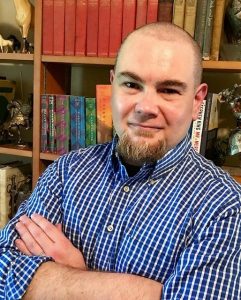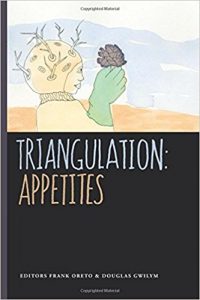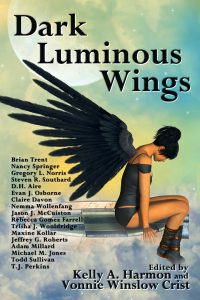Over the years, I’ve interviewed plenty of experienced authors. However, it’s also instructive for you beginning writers in my blog audience to hear from an author just beginning his writing adventure. Lucky for you, Jason J. McCuiston stopped by the towering Poseidon’s Scribe mansion and I asked him some questions.
 Jason J. McCuiston’s short story “The Last Red Lantern” was published in the anthology Triangulations: Appetites, and was a semifinalist in L. Ron Hubbard’s Writers of the Future Contest. His story “The Wyvern” will appear in the upcoming anthology Dark Luminous Wings. He’s working on a series titled The Shadow Crusade.
Jason J. McCuiston’s short story “The Last Red Lantern” was published in the anthology Triangulations: Appetites, and was a semifinalist in L. Ron Hubbard’s Writers of the Future Contest. His story “The Wyvern” will appear in the upcoming anthology Dark Luminous Wings. He’s working on a series titled The Shadow Crusade.
Let’s get to the interview:
Poseidon’s Scribe: How did you get started writing? What prompted you?
Jason J. McCuiston: I’ve always been a storyteller. When I was little, before I could read or write, I used to draw pictures of cowboys, soldiers, and knights, then sit in my parents’ or grandparents’ laps and tell them these elaborate stories of what was going on in the pictures. Eventually, I got good enough at the drawings that people could see what was going on, and so I gravitated toward a career in art. By the time I finished high school, I had discovered Frank Miller’s The Dark Knight Returns and knew I just had to go into comics.
That was my plan when I went to college to study graphic design and illustration. Then, in the mid to late ‘90s, the comics boom busted. While I was working as a security guard after graduating with my near-useless degree, I read an absolutely awful vampire novel and decided I could do that. So I did. I wrote my own absolutely awful vampire novel.
I then flirted with writing, off and on, for the next seven years until I found myself unemployed in 2004, and I decided to write a scifi/fantasy hybrid novel. I had done zero research on the industry (or on the craft for that matter) and yet I cranked out a neo-noir interplanetary heist caper featuring dwarves, elves, and space pirates blasting their way across a cold-war era star system in search of the ancient secret of FTL technology. It was crap but had enough good points that I got a couple requests from agents. These didn’t pan out, of course, so I went out and bought my first book on writing, James Scott Bell’s The Art of War for Writers, and I decided to get serious about becoming a writer.
P.S.: Who are some of your influences? What are a few of your favorite books?
J.J.M.: I have to say I’m heavily influenced by the works of Robert E. Howard and H.P. Lovecraft, as well as Alexandre Dumas, Edgar Allan Poe, and Rafael Sabatini. I have to include Lloyd Alexander here as well. I loved his Prydain Chronicles as a kid before I ever read Tolkien, and it doesn’t take much to see the influence of those stories on my own. My favorite contemporary authors are Bernard Cornwell, Jeff Shaara, Neil Gaiman, George R.R. Martin, and Stephen King. My favorite books of all time, in no particular order: All Quiet on the Western Front by Erich Maria Remarque, Musashi by Eiji Yoshikawa, and The Hitchhiker’s Guide to the Galaxy by Douglas Adams.
P.S.: Where do you get the ideas for your stories?
J.J.M.: I love history. I love learning new things. And I love the mysteries you can find in history. I like to say I write in the cracks of history; anytime there’s a question mark on the page, I let my mind fill it in. My story, “1057 A.D.,” for example, is my attempt to answer two questions: What really happened when Edward the Exile returned to England to be named Edward the Confessor’s heir? And why are European vampire stories as equally prevalent in England as they are in Central Europe?
P.S.: From your blog posts, it appears you enjoy horror stories, but have a preference for monsters and magic. What attracts you to that particular sector of the genre?
J.J.M.: The short answer is, I grew up playing Dungeons & Dragons. But I’m an escapist at heart. When the antagonist or the obstacle to be overcome in a story has a supernatural or science-fiction element to it, I think it gives the reader a way to process real-world issues in a safer environment. I’ve never been a fan of the slasher flick or torture horror. Our world is too full of real, all-too human monsters to waste my time reading or watching a piece of fiction based on what people are capable of doing to each other. We have the twenty-four hour news cycle for that.
P.S.: Do you illustrate some of your own books? Do those two talents—writing and graphic illustration—mix for you in some way? Do your drawings inspire your writing or the other way around?
J.J.M.: I did some cover mock ups for my completed manuscripts just to put on my website and on my Goodreads profile, but for the most part, I just write the stories now. However, whenever I feel the goblin of writer’s block rearing its ugly head, I break out the sketchbook just to keep the creative juices flowing. Occasionally I’ll sketch characters or scenes from the story I’m working on just for my own benefit, but for me the story usually comes before the imagery.
 P.S.: Your story, “The Last Red Lantern,” was published in the anthology Triangulation: Appetites. What can you tell us about that story?
P.S.: Your story, “The Last Red Lantern,” was published in the anthology Triangulation: Appetites. What can you tell us about that story?
J.J.M.: I don’t recall what inspired me to research the Boxer Rebellion at the time, but I did and out of the horrors of the Siege of Tientsin grew this idea of a young Chinese girl rescued by an American soldier, taken and raised on a Montana Ranch. She later returns to Asia to seek her mother, a legendary leader of the Red Lanterns, an all-woman martial-arts organization. Like most of my stories, it has speculative elements (in this case a warlock and a zombie army) in a historical setting (the eastern edge of the crumbling Russian Empire in 1917). I think it met the theme of the anthology, “Appetites,” because many of us hunger to know where we come from and how our origins can affect who we are.
P.S.: What are the easiest, and the most difficult, aspects of writing for you?
J.J.M.: The easiest part is the actual writing when I get into that zone, where it feels like I’m just transcribing the words and actions of what these characters are saying and doing in this amazing time and space that only exists in my head. Sometimes, in those moments, I feel like I could write the whole manuscript in one draft in one day. The hardest part for me, being a lifelong introvert, is adapting to the social media aspect of self-promotion. Don’t get me wrong, I have met some amazing people (yourself included) via the internet, and I love the sense of community I’ve discovered with other writers. My problem is just trying to get my mind to switch gears from blog posts, tweets, and that sort of thing back to real, honest-to-goodness fiction writing.
P.S.: Are you a member of a writer’s critique group? If so, please tell us about it, and tell us if you think the group has helped your writing.
J.J.M.: It’s not a group, per se, but I’ve got a couple of writer friends with whom I’ve swapped manuscripts this year. The three of us happen to live on different continents, so I affectionately call them my “International Critique Partners.” From G.L. Cromarty, the amazing author of the Divided World Series, I’ve learned a lot about pacing a large-scale plot and how to keep the human element relevant in global dramas. She’s also my social media coach, helping me out of my 20th century shell! Marcus Henson, author of the upcoming Honour Among Thieves novel, is a world-builder extraordinaire, and a master of fast-paced action sequences. Not only have I benefited from studying their impressive skillsets, and getting their constructive criticism, but I’m also recharged by their passion for the craft. Sometimes I love reading writers write about writing more than I enjoy reading fiction.
 P.S.: Your story, “The Wyvern,” will appear in the upcoming anthology Dark Luminous Wings. Please tell us a little about the setting and protagonist of that story.
P.S.: Your story, “The Wyvern,” will appear in the upcoming anthology Dark Luminous Wings. Please tell us a little about the setting and protagonist of that story.
J.J.M.: I love the Fallout video games, and I was replaying Fallout 3 last year when I watched a little horror movie called The Atticus Institute, about the MK Ultra government experiments in the 1960s. In the film, the psychic experiments go completely of the rails when a subject turns out to be demonically possessed instead of being a normal human psychic. So I thought, “What if the world was destroyed not by a nuclear holocaust, but by a supernatural one?” And so I created what I called “The World after Tomorrow;” our world where the human race has finally started to recreate civilization six centuries after magic and monsters have completely reshaped the planet. It became my sandbox where I could just practice the craft of writing; I could write horror stories, westerns, high fantasies, neo-noir detective stories, military adventures, and in the case of “The Wyvern,” a steampunk ghost-ship story set in the skies above the Mojave Desert. As a nod to Alfred Hitchcock’s Rear Window, I wanted the story’s lead, Captain Noah Oggs, to be incapacitated with broken legs when the horror hits his airship the Cibola.
P.S.: You’re writing a series of short stories and novels called The Shadow Crusade. Please tell us about the world and main character of that series.
J.J.M.: The Shadow Crusade begins in the England and Normandy of 1096, just as the First Crusade is getting underway. I was inspired by Umberto Echo’s The Name of the Rose, and really liked the idea of a Sherlock-Holmes style character in the Middle Ages, but of course, me being me, he would have to deal with magic and monsters. Much like the protagonist of your story, “Instability,” Godric is a Renaissance man centuries ahead of his time. However, he is really too smart for his own good sometimes; he is a hedonist and an iconoclast, despite (or because of) being raised by monks. He is a Saxon orphan who is forced to ally with Robert, an introverted and dogmatic Norman squire, in order to save the world from evil. At its heart, the series is about true friendship; two young men have to overcome their racial and social differences in order to rely on one-another and form a lasting bond as strong as brothers.
Poseidon’s Scribe: What advice can you offer aspiring writers?
Jason J. McCuiston: Understand that rejection is just part of the process. If you can’t handle that, do something else. If someone gives you feedback, take it in, digest it, and let it make you better. Also, just because your story is not right for this agent or that editor, it doesn’t mean that it isn’t right for another one. Keep writing, keep revising, keep submitting, and keep going. I have said, “I may write more bad stories than good ones, but I do write good stories.” My goal is to change that ratio, and the only way to do that is to just keep writing. Remember that: writing in itself is the goal, not the means by which we achieve something else. Write good stories and success will take care of itself.
Thanks, Jason, for your answers and for mentioning my own story! Readers eager to find out more about Jason can check out his website, his Facebook page, his Twitter feed, and his Goodreads profile.
Poseidon’s Scribe
